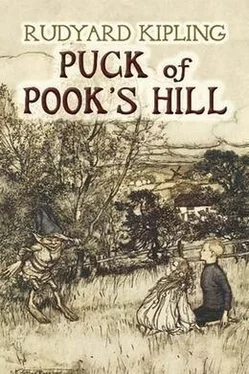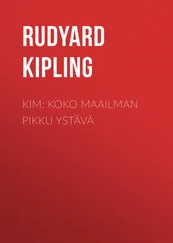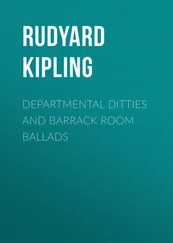Rudyard Kipling - Puck of Pook's Hill
Здесь есть возможность читать онлайн «Rudyard Kipling - Puck of Pook's Hill» весь текст электронной книги совершенно бесплатно (целиком полную версию без сокращений). В некоторых случаях можно слушать аудио, скачать через торрент в формате fb2 и присутствует краткое содержание. Год выпуска: 2014, Издательство: epubBooks Classics, Жанр: Фэнтези, на английском языке. Описание произведения, (предисловие) а так же отзывы посетителей доступны на портале библиотеки ЛибКат.
- Название:Puck of Pook's Hill
- Автор:
- Издательство:epubBooks Classics
- Жанр:
- Год:2014
- ISBN:нет данных
- Рейтинг книги:3 / 5. Голосов: 1
-
Избранное:Добавить в избранное
- Отзывы:
-
Ваша оценка:
- 60
- 1
- 2
- 3
- 4
- 5
Puck of Pook's Hill: краткое содержание, описание и аннотация
Предлагаем к чтению аннотацию, описание, краткое содержание или предисловие (зависит от того, что написал сам автор книги «Puck of Pook's Hill»). Если вы не нашли необходимую информацию о книге — напишите в комментариях, мы постараемся отыскать её.
Puck of Pook's Hill — читать онлайн бесплатно полную книгу (весь текст) целиком
Ниже представлен текст книги, разбитый по страницам. Система сохранения места последней прочитанной страницы, позволяет с удобством читать онлайн бесплатно книгу «Puck of Pook's Hill», без необходимости каждый раз заново искать на чём Вы остановились. Поставьте закладку, и сможете в любой момент перейти на страницу, на которой закончили чтение.
Интервал:
Закладка:
'Now there was a poor widow at Dymchurch under the Wall, which, lacking man or property, she had the more time for feeling; and she come to feel there was a Trouble outside her doorstep bigger an' heavier than aught she'd ever carried over it. She had two sons—one born blind, an' t'other struck dumb through fallin' off the Wall when he was liddle. They was men grown, but not wage–earnin', an' she worked for 'em, keepin' bees and answerin' Questions.'
'What sort of questions?' said Dan.
'Like where lost things might be found, an' what to put about a crooked baby's neck, an' how to join parted sweethearts. She felt the Trouble on the Marsh same as eels feel thunder. She was a wise woman.'
'My woman was won'erful weather–tender, too,' said Hobden. 'I've seen her brish sparks like off an anvil out of her hair in thunderstorms. But she never laid out to answer Questions.'
'This woman was a Seeker, like, an' Seekers they sometimes find. One night, while she lay abed, hot an' achin', there come a Dream an' tapped at her window, an' "Widow Whitgift," it said, "Widow Whitgift!"
'First, by the wings an' the whistlin', she thought it was peewits, but last she arose an' dressed herself, an' opened her door to the Marsh, an' she felt the Trouble an' the Groanin' all about her, strong as fever an' ague, an' she calls: "What is it? Oh, what is it?"
'Then 'twas all like the frogs in the diks peepin'; then 'twas all like the reeds in the diks clip–clappin'; an' then the great Tide–wave rummelled along the Wall, an' she couldn't hear proper.
'Three times she called, an' three times the Tide–wave did her down. But she catched the quiet between, an' she cries out, "What is the Trouble on the Marsh that's been lying down with my heart an' arising with my body this month gone?" She felt a liddle hand lay hold on her gown–hem, an' she stooped to the pull o' that liddle hand.'
Tom Shoesmith spread his huge fist before the fire and smiled at it.
'"Will the sea drown the Marsh?" she says. She was a Marsh woman first an' foremost.
'"No," says the liddle voice. "Sleep sound for all o' that."
'"Is the Plague comin' to the Marsh?" she says. Them was all the ills she knowed.
'"No. Sleep sound for all o' that," says Robin.
'She turned about, half mindful to go in, but the liddle voices grieved that shrill an' sorrowful she turns back, an' she cries: "If it is not a Trouble of Flesh an' Blood, what can I do?"
'The Pharisees cried out upon her from all round to fetch them a boat to sail to France, an' come back no more.
'"There's a boat on the Wall," she says, "but I can't push it down to the sea, nor sail it when 'tis there."
'"Lend us your sons," says all the Pharisees. "Give 'em Leave an' Good–will to sail it for us, Mother—O Mother!"
'"One's dumb, an' t'other's blind," she says. "But all the dearer me for that; and you'll lose them in the big sea." The voices justabout pierced through her; an' there was children's voices too. She stood out all she could, but she couldn't rightly stand against that . So she says: "If you can draw my sons for your job, I'll not hinder 'em. You can't ask no more of a Mother."
'She saw them liddle green lights dance an' cross till she was dizzy; she heard them liddle feet patterin' by the thousand; she heard cruel Canterbury Bells ringing to Bulverhithe, an' she heard the great Tide–wave ranging along the Wall. That was while the Pharisees was workin' a Dream to wake her two sons asleep: an' while she bit on her fingers she saw them two she'd bore come out an' pass her with never a word. She followed 'em, cryin' pitiful, to the old boat on the Wall, an' that they took an' runned down to the sea.
'When they'd stepped mast an' sail the blind son speaks: "Mother, we're waitin' your Leave an' Good–will to take Them over."'
Tom Shoesmith threw back his head and half shut his eyes.
'Eh, me!' he said. 'She was a fine, valiant woman, the Widow Whitgift. She stood twistin' the eends of her long hair over her fingers, an' she shook like a poplar, makin' up her mind. The Pharisees all about they hushed their children from cryin' an' they waited dumb–still. She was all their dependence. 'Thout her Leave an' Good–will they could not pass; for she was the Mother. So she shook like a aps–tree makin' up her mind. 'Last she drives the word past her teeth, an' "Go!" she says. "Go with my Leave an' Goodwill."
'Then I saw—then, they say, she had to brace back same as if she was wadin' in tide–water; for the Pharisees just about flowed past her—down the beach to the boat, I dunnamany of 'em—with their wives an' childern an' valooables, all escapin' out of cruel Old England. Silver you could hear chinkin', an' liddle bundles hove down dunt on the bottom–boards, an' passels o' liddle swords an' shields raklin', an' liddle fingers an' toes scratchin' on the boatside to board her when the two sons pushed her off. That boat she sunk lower an' lower, but all the Widow could see in it was her boys movin' hampered–like to get at the tackle. Up sail they did, an' away they went, deep as a Rye barge, away into the off–shore mists, an' the Widow Whitgift she sat down an' eased her grief till mornin' light.'
'I never heard she was all alone,' said Hobden.
'I remember now. The one called Robin, he stayed with her, they tell. She was all too grievious to listen to his promises.'
'Ah! She should ha' made her bargain beforehand. I allus told my woman so!' Hobden cried.
'No. She loaned her sons for a pure love–loan, bein' as she sensed the Trouble on the Marshes, an' was simple good–willin' to ease it.' Tom laughed softly. 'She done that. Yes, she done that! From Hithe to Bulverhithe, fretty man an' maid, ailin' woman an' wailin' child, they took the advantage of the change in the thin airs just about as soon as the Pharisees flitted. Folks come out fresh an' shinin' all over the Marsh like snails after wet. An' that while the Widow Whitgift sat grievin' on the Wall. She might have belieft us—she might have trusted her sons would be sent back! She fussed, no bounds, when their boat come in after three days.'
'And, of course, the sons were both quite cured?' said Una.
'No–o. That would have been out o' Nature. She got 'em back as she sent 'em. The blind man he hadn't seen naught of anythin', an' the dumb man nature–ally he couldn't say aught of what he'd seen. I reckon that was why the Pharisees pitched on 'em for the ferryin' job.'
'But what did you—what did Robin promise the Widow?' said Dan.
'What did he promise, now?' Tom pretended to think. 'Wasn't your woman a Whitgift, Ralph? Didn't she ever say?'
'She told me a passel o' no–sense stuff when he was born.' Hobden pointed at his son. 'There was always to be one of 'em that could see further into a millstone than most.'
'Me! That's me!' said the Bee Boy so suddenly that they all laughed.
'I've got it now!' cried Tom, slapping his knee. 'So long as Whitgift blood lasted, Robin promised there would allers be one o' her stock that—that no Trouble 'ud lie on, no Maid 'ud sigh on, no Night could frighten, no Fright could harm, no Harm could make sin, an' no Woman could make a fool of.'
'Well, ain't that just me?' said the Bee Boy, where he sat in the silver square of the great September moon that was staring into the oast–house door.
'They was the exact words she told me when we first found he wasn't like others. But it beats me how you known 'em,' said Hobden.
'Aha! There's more under my hat besides hair?' Tom laughed and stretched himself. 'When I've seen these two young folk home, we'll make a night of old days, Ralph, with passin' old tales—eh? An' where might you live?' he said, gravely, to Dan. 'An' do you think your Pa 'ud give me a drink for takin' you there, Missy?'
Читать дальшеИнтервал:
Закладка:
Похожие книги на «Puck of Pook's Hill»
Представляем Вашему вниманию похожие книги на «Puck of Pook's Hill» списком для выбора. Мы отобрали схожую по названию и смыслу литературу в надежде предоставить читателям больше вариантов отыскать новые, интересные, ещё непрочитанные произведения.
Обсуждение, отзывы о книге «Puck of Pook's Hill» и просто собственные мнения читателей. Оставьте ваши комментарии, напишите, что Вы думаете о произведении, его смысле или главных героях. Укажите что конкретно понравилось, а что нет, и почему Вы так считаете.












